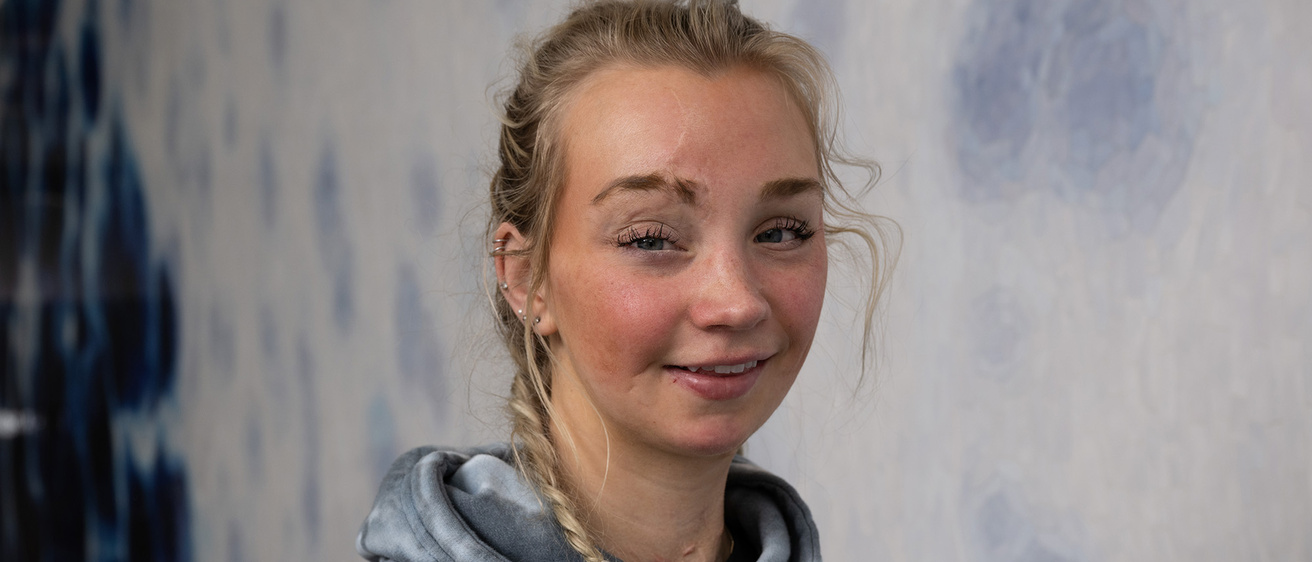Four years after suffering massive head trauma in an automobile accident, requiring lengthy surgery and facial reconstruction at UI Health Care, Maggie McQuillen left the Carver-Hawkeye Arena stage as a University of Iowa grad.
Story: Emily Nelson
Photography: Tim Schoon and Justin Torner
Published: May 13, 2024
Maggie McQuillen celebrated her high school graduation at the Shirley Ryan AbilityLab in Chicago, where she was recovering from an automobile accident that nearly took her life. A friend in Anamosa, Iowa, accepted her diploma in her honor.
Four years later, McQuillen walked across the Carver-Hawkeye Arena stage to accept a degree in exercise science from the University of Iowa.
It’s been a remarkable journey from that day in March 2020 when McQuillen was rushed from an automobile accident near her hometown of Anamosa, Iowa, to UI Health Care, where she was treated for massive trauma to her skull, brain, face, and jaw.
“After Maggie’s accident, as parents we thought it may be best for Maggie to wait a year before going to college,” says McQuillen’s dad, Matt McQuillen. “Take time to deal not only with her serious injuries and surgeries but also allow the entire COVID saga to settle down. She was absolutely determined to continue as she had always planned and attend the University of Iowa. There was no holding her back. To think she is graduating from college after all she has dealt with these past four years is amazing. She is an inspiring young lady and we are very proud of her.”
During the month she spent at UI Health Care and in the months afterward, McQuillen was cared for by multiple teams, including the emergency department, intensive care unit, neurosurgery, oral and maxillofacial surgery, and ophthalmology.
After the accident and throughout her first year of college, McQuillen worked hard to regain strength and mobility through occupational therapy, speech therapy, and physical therapy.
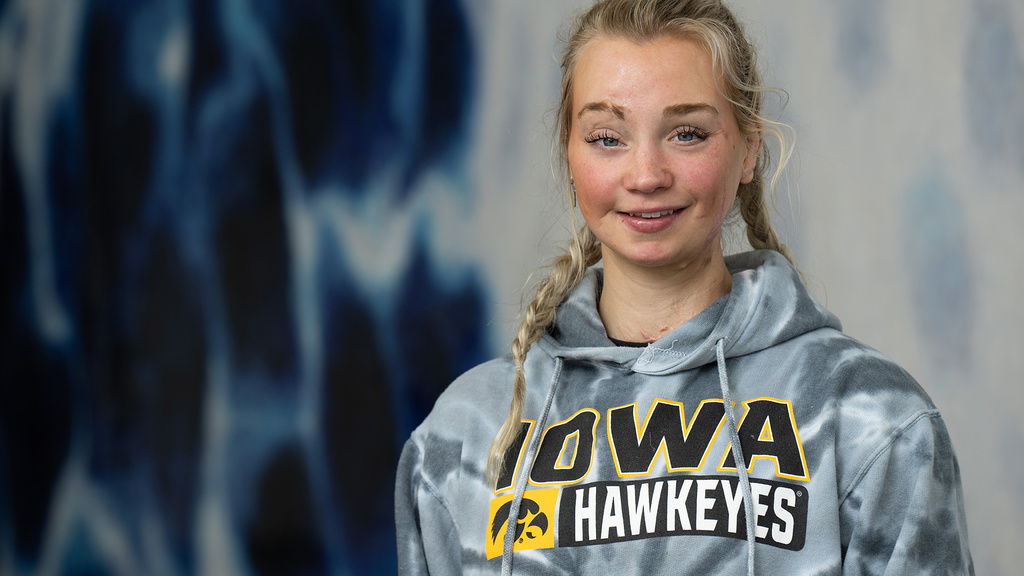
Graduate spotlight: Maggie McQuillen
Physical activity has always played a big role in Maggie McQuillen’s life. “I’ve been working out my whole life. I played four sports in high school,” McQuillen says. “When I started taking classes for exercise science, I loved it right away.” Physical fitness will continue to play a role in her career—most immediately as a personal trainer.
Now, McQuillen plans to continue her work after graduation as a personal trainer, using her degree to help others reach and maintain their fitness goals—whatever they may be.
“One of my clients recently told me, ‘Maggie, we carry bags of mulch up the hill every year, and this year it was so much easier. And that’s because of the training. Thank you so much,’” McQuillen says. “That was just so awesome to hear.”
Learn more about Maggie’s experience in this story from September 2021.
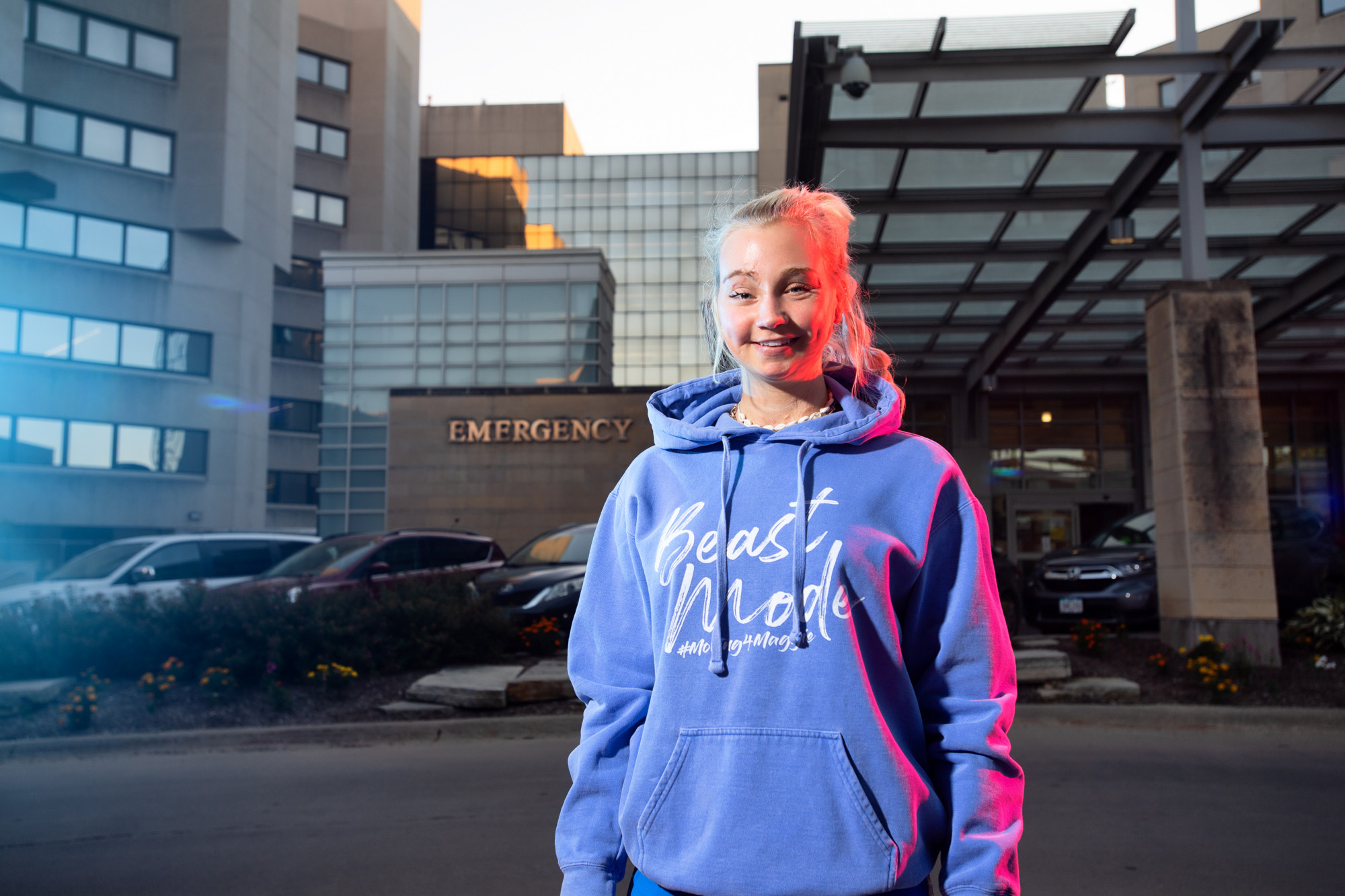
Maggie McQuillen wears one of the “Beast Mode #Moving4Maggie” shirts that were sold after her near-fatal car accident in March 2020. The family donated the money raised to the people who helped save her life: $10,000 each to the Anamosa Fire Department and Anamosa area ambulance.
Maggie McQuillen stepped onto the University of Iowa campus as a first-year student in August 2020—just five months after an accident nearly took her life.
“I honestly didn’t think I’d ever get a chance to actually ‘meet’ Maggie when she first came in,” says Scott Owen, MD, plastic and reconstructive surgeon, director of the Facial Nerve Center, and director of facial plastic and reconstructive surgery. “Many people who come into the hospital in her condition don’t survive.”
Owen says the fact that she did is all down to the level of care she received at University of Iowa Hospitals & Clinics.
“No question that the reason she is alive, let alone enrolled in college right now, is a testament to my colleagues,” Owen says. “My oral and maxillofacial surgery, ophthalmology, and neurosurgical colleagues, our emergency and ICU teams—everyone is just outstanding. All everyone wants is to get people to 100%. It’s a very special place.”
“They’re amazing,” McQuillen says. “I had some of the best doctors ever; I think I even had some famous doctors. But everyone from the doctors to the nurses have been so helpful through all of it.”
It was March 19, 2020, and McQuillen, then a high school senior, had spent the morning at home in Anamosa, Iowa, working on college scholarships before getting in the car to head to a voluntary track practice. A semi pulled into her lane, shearing off the top of her car as it went over her. McQuillen suffered massive trauma to her skull, brain, face, and jaw. One ear was severed.
“From the neck up, she was a mess,” says her mother, Beth McQuillen. “From the neck down, you couldn’t tell.”
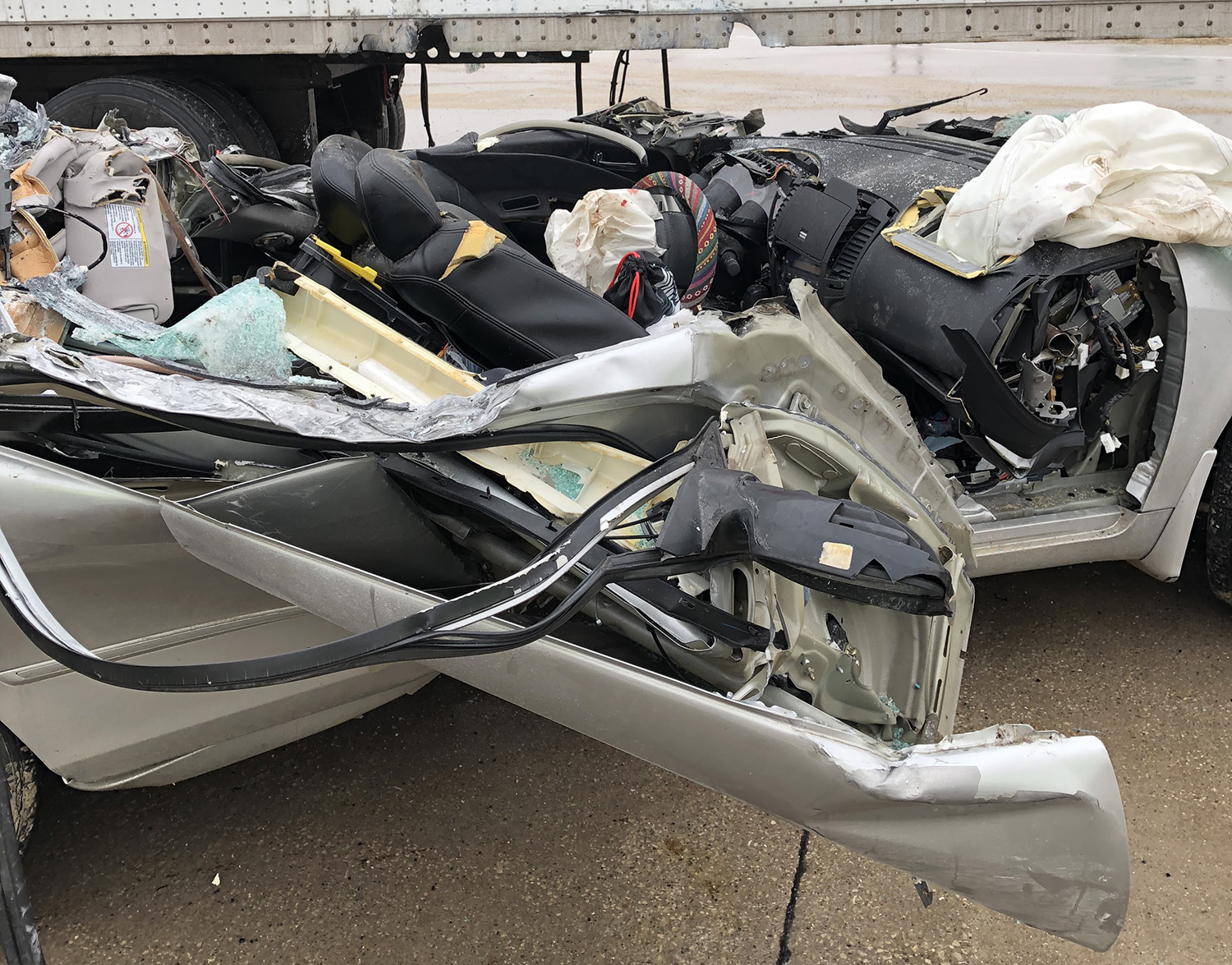
Maggie McQuillen's vehicle after the accident. “Many people who come into the hospital in her condition don’t survive,” says Scott Owen, MD, plastic and reconstructive surgeon, director of the Facial Nerve Center, and director of facial plastic and reconstructive surgery. (Photo courtesy of the McQuillen family.)
After being taken to Jones Regional Medical Center, McQuillen was rushed to UI Hospitals & Clinics. The first few weeks were touch-and-go and included a 15-hour surgery to begin facial reconstruction.
“Putting faces back together is very laborious, and the temptation for a surgeon might be to hedge their bets and say, ‘That’s a lot of work to do on someone who is fighting for their life,’” Owen says. “But one of the things I stress to our residents—and Maggie is a prime example of it—is never do that. Always be an optimist for your patients. This is our opportunity to make things right, so spend the time to put people back together like they’re a member of your family. If you’re proven wrong, let it be because you were too optimistic. Don’t be wrong the other way.”
Maggie doesn’t remember the month she spent at UI Hospitals & Clinics; her first memory after the accident came in June at the Shirley Ryan AbilityLab in Chicago, where she spent six weeks for rehabilitation.
But her parents remember every minute, and they say they appreciate the great care shown to Maggie and to them by everyone from doctors to nurses to hospital staff. The hospital had recently implemented COVID-19 protocols, including limiting visitors for adult patients. Maggie had just turned 18, but Beth and Matt were both allowed to be with her.
“That was a huge blessing,” Beth McQuillen says. “It would have been hard on either of us to not be with her.”
“Having both of us there as part of her care team was helpful to her,” adds Maggie’s father, Matt. “There were concerns about getting her ready for surgery and potentially exposing her and others to COVID-19. It was just another hurdle to go along with her serious injuries. But through it all, her team was always looking out for her.”
“No question that the reason she is alive, let alone enrolled in college right now, is a testament to my colleagues. My oral and maxillofacial surgery, ophthalmology, and neurosurgical colleagues, our emergency and ICU teams—everyone is just outstanding. All everyone wants is to get people to 100%. It’s a very special place.”
The McQuillens say they appreciate being so included in Maggie’s care.
“That was the neat thing about the University of Iowa: There’s that team element, and we felt like part of the team,” Beth McQuillen says. “We always felt well-informed about where she was currently at. We never felt shut out.”
While Maggie returned home from the rehabilitation hospital in mid-June, her journey to recovery wasn’t over. She worked hard to regain strength and mobility by attending an outpatient neurological clinic in Coralville, Iowa, several times a week for occupational therapy, speech therapy, and physical therapy. This continued through her first year of college.
Beth and Matt McQuillen say they were nervous about Maggie starting college, but proud of her as well.
“We knew that she had to be challenged eventually, and she was ready to go,” Beth McQuillen says. “She said, ‘I may have had this accident, but my plan is to go to college.’ We just really thought that we had to let her. And she just took off.”
Along with rehab, Maggie has undergone several procedures over the past year to help minimize scarring, improve skin elasticity, and repair the orbital floor on her right eye to return it to its original position.
“We’re now just working to tweak things and get her as functional as we possibly can,” Owen says. “There are little things that probably bother me more than they bother her! Maggie isn’t as concerned about this stuff as many people would be. She’s a great kid and very free-spirited.”
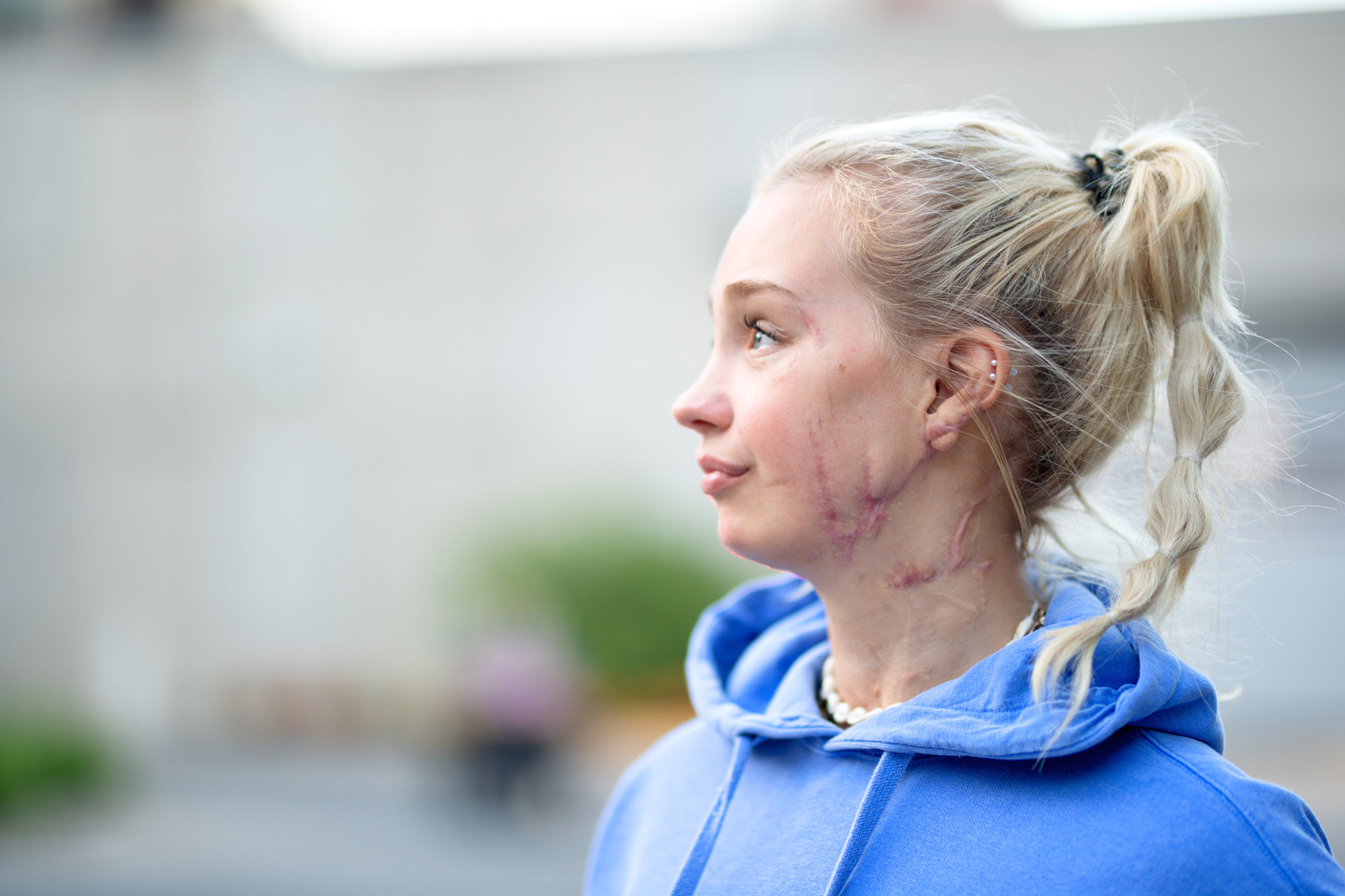
While working with her physical therapist, Maggie McQuillen realized “that this is what I want to do. I want to work with people like me.” To that end, Maggie is working toward a degree in human physiology at Iowa. She also recently started work as an EMT, inspired by the men and women who came to her aid at the scene of her accident.
Maggie says she feels confident in the decisions she makes thanks to Owen and other doctors taking time to explain all her options.
“He gives me all the options, from least invasive to most invasive, and helps me understand what each one entails and what the outcomes would be,” Maggie says.
Owen says educating his patients on their care options is an important part of his job.
“I’m there to guide them through a process and then, ultimately, execute a plan,” Owen says. “But it’s their body, their decision.”
The accident and recovery affected Maggie’s life in more ways than one.
“I’ve always known I wanted to do something in the medical field,” Maggie says. “I had been thinking of becoming an ER doctor. But while working with my physical therapist, I realized that this is what I want to do. I want to work with people like me.”
To that end, she is working toward a degree in human physiology at Iowa. She also recently started work as an EMT, inspired by the men and women who came to her aid at the scene of her accident.
“That was the neat thing about the University of Iowa: There’s that team element, and we felt like part of the team. We always felt well-informed about where she was currently at. We never felt shut out.”
Owen says a story that Maggie’s mother told him regarding first responders was particularly impactful.
“She said that two police officers who were first on the scene came to visit Maggie when she was out of the hospital and one of them became very emotional because he really thought she wouldn’t survive when they found her,” Owen says. “I think that really speaks to the gravity of the situation, as well as the teamwork it took from the first people on the scene all the way through rehab, to how brave and heroic Maggie is.”
Maggie encourages anyone finding themselves in a situation similar to hers to not automatically expect the worst.
“Wait until you know what is coming before you make any conclusions,” Maggie says. “Keep a positive mindset and you’re more likely to have good things happen.”
Owen echoes that sentiment and urges patients to not only think of recovery as day to day, but also week to week and month to month.
“Once you start getting further out, you can think about how you were doing this time last month,” Owen says. “And if you start to get frustrated with things day-to-day, think about all the incredible things you’ll be able to do a month from now, or think about where you were this time last month. I think that really helps you start to conceptualize how incredible your body is, how incredible the healing process is, and how much progress you’ve made.”
Owen says Maggie is the poster child for taking this advice to heart.
“Maggie has just been a miraculous case,” Owen says. “I’m thrilled that we get to sit in clinic talking about how we can make these scars look better because without her youth, excellent physical condition, a top health care team, divine intervention, and probably a little luck, she wouldn’t be here, or she wouldn’t be here in such good health.
“She’s a wonderful kid, hardworking, optimistic, super dedicated, and smart. A total rock star. And she’s got a wonderful family. You couldn’t ask for anyone better in your corner than them.”
